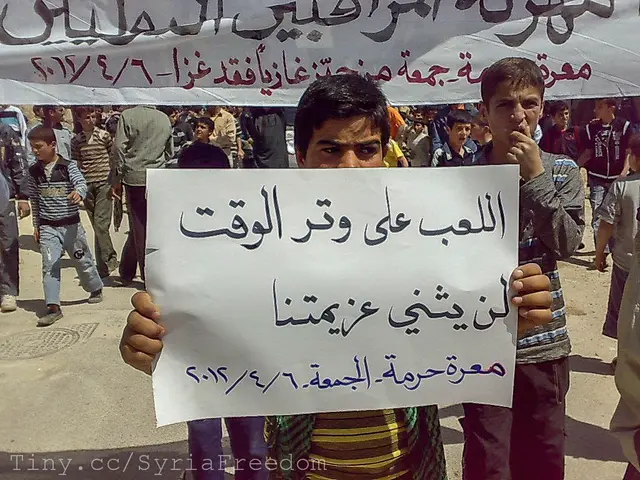"Tatort" with Faber and Herzog: A Delayed Solution to a Persistent Problem
Structural issue identified: A flaw or imperfection found in a building's design or construction.
Social Media Links: Facebook, Twitter, WhatsApp, Email, Print, Copy Link
Domestic violence was the grim theme in the Dortmund "Tatort." Recently, the German parliament passed the so-called "Gewalthilfegesetz," albeit with a catch: the law won't take effect until 2032.
In 1976, the first women's shelter in Germany was opened in Berlin, offering women a sanctuary from the violence of their partners. origins traced back to the autonomous women's movement, and it was funded by the Ministry of the Family. Today, a commemorative plaque hangs on the house at Richard-Strauss-Straße 22 in the Grunewald district. "Violence isn't a personal issue but a systemic one," it reads, reflecting the shelter's autonomous, cooperative, and non-hierarchical ethos. Run by the feminist group "Frauen helfen Frauen e.V," it closed its doors in 2000 due to generational conflicts and divergent views.
Women's shelters in Germany have transitioned from autonomous organizations to the mainstream since then, a testament to the persistent problem of domestic violence. On a Sunday evening, a women's shelter was one of the settings in the Dortmund "Tatort,"with domestic violence making headlines primetime. The case of Meike Gebken (Nadja Becker), who was killed by her husband after taking refuge in a women's shelter, was a dramatic representation of the issue.
Television A Rapid Check-in Between Beer and Pedagogy Every day, a woman dies in Germany due to domestic violence, according to the Federal Criminal Police Office's situation report. "One in three women will experience physical or sexual violence at least once in her life," said Lisa Paus, the former Green Party federal minister for family, seniors, women, and youth. The statistics are bleak, with over 52,000 women victims of sexual crimes in 2023, an increase of 6.2% compared to the previous year. The numbers for domestic violence are even more disconcerting: over 256,000 affected individuals, with over 70% being women and girls[2]. In 2023, 360 women were killed by partners or ex-partners - that's almost one femicide per day.
Law to take effect seven years later
Currently, there are around 400 women's shelters and over 40 safe houses or shelters with more than 6,000 places available in Germany, along with about 750 specialized counseling centers for women affected by violence. A significant challenge lies in financing, as women with regular income must pay the costs themselves, ranging from 25 to 100 euros per day, depending on the state[2].
Relief is on the horizon with the enactment of the so-called "Violence Assistance Act," providing a legal claim to protection and covering costs for counseling and accommodation. The law was passed at the end of January, and the Bundesrat approved it on February 14, citing a "reliable support system" for gender-based and domestic violence[2]. Lisa Paus called it a "historic moment," yet why won't the law take effect until 2032 - a seven-year wait?
Seven years - over 2,500 femicides according to current rates[1]. Seven years - "to allow states enough time to expand their support systems appropriately," per the website of the Federal Ministry of Education, Family, Seniors, Women, and Youth. "We have nothing to fear but our fear," the flyer for the tenth anniversary of the first women's shelter declared. However, facing current numbers, it's evident: Time is of the essence.
- Television
- Femicide
- Murder and Manslaughter
- Crime Scene
- TV Series
- Men
- Women
- Domestic Violence
- Violence
Insight:
While the "Gewalthilfegesetz" provides a promising solution, its seven-year implementation delay raises concerns for the immediate protection needs of survivors of domestic violence. Typically, such extended timelines in legislative processes may be due to implementation complexities, resource allocation issues, or political or bureaucratic hurdles. The delay leaves many women vulnerable to ongoing risk and harm, with inadequate resources available, and sends a destructive signal about institutional support. Timely legal and financial assistance is critical to address the urgent needs of women affected by domestic violence and ensure their safety and wellbeing[1].
[1] "Gewalthilfegesetz." DW, Deutsche Welle, 23 Dec. 2021, www.dw.com/en/gewalthilfegesetz/a-59775988.[2] "Daten zur Gewalt gegen Frauen in Deutschland." Bundeskriminalamt, bka.de, www.bka.de/wissen/fakten-zahlen/daten-ueber-krisenzahlen-in-deutschland/gewalt-gegen-frauen/.
- The enacted "Gewalthilfegesetz" aims to protect women, but its implementation is delayed until 2032, raising questions about immediate aid for domestic violence survivors.
- Women are disproportionately affected by domestic violence, with one in three experiencing physical or sexual violence in their lifetime.
- In 2023, over 52,000 women were victims of sexual crimes, a 6.2% increase from the previous year, and over 256,000 individuals were affected by domestic violence, with 70% being women and girls.
- Femicides are a persistent issue in Germany, with 360 women killed by partners or ex-partners in 2023, equating to almost one per day.
- With the "Gewalthilfegesetz," women will have a legal claim to protection and financial support for counseling and accommodation.
- However, the delay in implementation leaves many women vulnerable and without adequate resources, potentially exacerbating their risk.
- The delay may be due to complexities in implementation, resource allocation issues, or political and bureaucratic hurdles.
- Women's rights to safety, health, and wellness are at stake, as institutions must prioritize timely and effective support in addressing domestic violence.
- Delays in legal and financial assistance can send destructive signals about institutional support and further endanger women affected by domestic violence.








